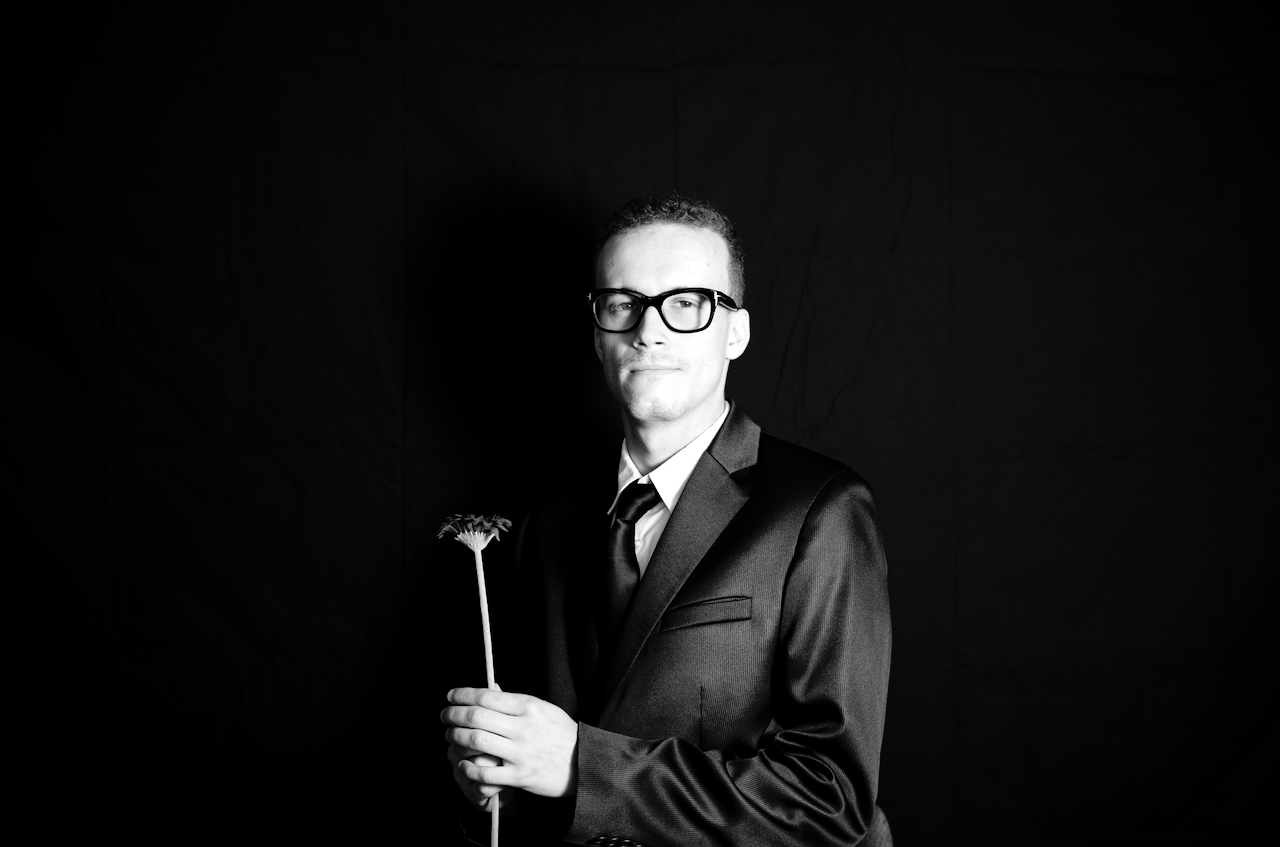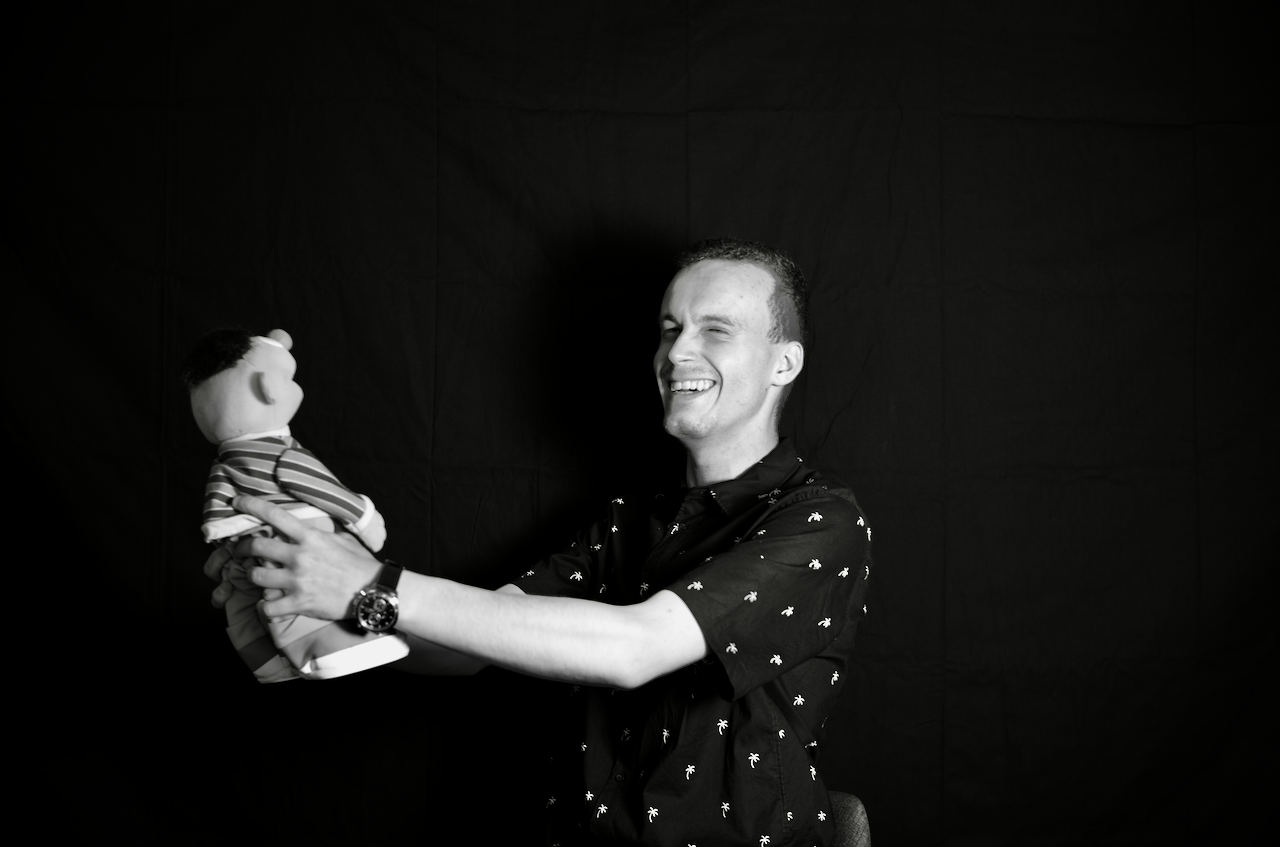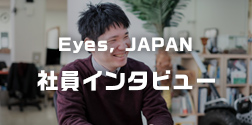Eyes, JAPAN
Eyes, JAPAN Employee Interview [Vol.1]
Angelita
The special series to put a spotlight on our international staff, “Eyes, JAPAN employee interview” has started! Our 1st interviewee is Peter Kudry from Slovakia.
He has been working in Eyes, JAPAN for about 8 months, and now he is engaged in hardware. He is usually tasked with a revival of older projects that ceased functioning due to some mechatronic faults, or designing and building new devices which will be used for certain projects.
We wanted to ask Peter about his life in Japan, why he started to study and work in Japan and what does he think about working in Eyes, JAPAN.
(Interviewer: Angie)
Coming to Japan was a childhood dream.

Which country did you come from, and what do you like about your home country/town?
Peter: I was born in Slovakia, but I lived in Denmark before coming to Japan. My home town is small, even smaller than Aizuwakamatsu, however, I like the variety of things there such as old and new architecture, shopping malls, nature, parks, etc.
Why did you come to Japan and what do you like about Japan?
Peter: It was my childhood dream to come to Japan and study here. It always seemed that Japan is ahead of time when it comes to IT. I love cars and the car culture here, especially in the country side, it is amazing!
What do you think about life in Aizu?
Peter: I always preferred, smaller cities to big ones. Life in Aizu is nice and quiet compared to Tokyo or even Sendai but there are not as many fun places here than elsewhere (i.e., cinema). However, Koriyama and Fukushima are close so it does not bother me at all. On the weekend or holiday, My favourite way to spend weekend or holidays here in Aizu is simply with friends, having a laugh, going somewhere or just grabbing a beer together and hanging out in a park.
What is your hobby and how do you usually spend your free time?
Peter: My hobbies are car repairs, modifications and learning about mechanical engineering. And the way I spend my free time really depends on the weather. The weather in Aizu is all around the place, so if it is raining / snowing, I like to do house work. If it sunny, I work on my car or hang out with friends.
Eyes, JAPAN is a very innovative, a bit unconventional in a good way, yet relaxed place to work at.
How did you know about Eyes, JAPAN?
Peter: I got to know about Eyes, JAPAN, from my friends, who I know from university, and who worked at Eyes, JAPAN at the time. At the time, when I was considering joining, Eyes, JAPAN sounded like a very innovative, a bit unconventional in a good way, yet relaxed place to work at. And now I can happily confirm that all of the above are true, so I am happy I could join.
What is your role and what kind of projects have you been working on in Eyes, JAPAN, and which one is the most memorable?
Peter: As you probably realized from the info above, I am a hardware guy. I am usually tasked with a revival of older projects that ceased functioning due to some mechatronic faults. Or I am tasked with designing and building new devices which will be used for certain projects. Sometimes I also work as an on-site repairman. I mentioned that Eyes, JAPAN is a bit of an unconventional company, so every project is memorable in its own way. However, I do like working as an on-site repairman quite a lot. Being sent to costumer’s location, solving their hardware or software issues, then returning back to HQ (our office) always feels like I am saving the day.
What customs in Eyes, JAPAN that you like the most?
Peter: I would say that the weekly meetings we hold are a bit underrated. Not only it brings responsibility to the presenter to teach the rest of the team about a topic they might not be familiar with, it also encourages everyone to voice their progress, status or hurdles they have encountered. This process highlights the solidarity of our team members as everyone gets to know each other’s status and can potentially offer help, or one can ask for help from others. Therefore, I like and appreciate the weekly meetings.
What do you think about your colleagues in Eyes, JAPAN?
Peter: Everyone is quite goal-oriented and what I have seen so far, a lot of us are very stubborn. Not towards each other, but towards defeat. I feel that everyone does their best in terms of finding solutions for problems and challenges and even if something is not working out as planned, the team prevails and finds the best way to reach its goal. Maybe ‘stubborn’ isn’t the right word to use here, ‘persevere’ describes it better.
What about the working environment in Eyes, JAPAN?
Peter: The working environment is very nice. Our boss always makes sure that we are happy with the equipment and if something is needed to improve workflow or efficiency, it does not take more than one good reason to get such change implemented. Furthermore, instant coffee is prohibited, and only properly brewed grinded coffee beans are allowed to be served. If the quality of provided programmers’ fuel (coffee) does not describe the environment enough, then I do not know what does.
Stop worrying about little things and just do it!
Have you experienced any culture shock while working in Japan?
Peter: Not very much. I was used to working under full SCRUM guidelines before, and many of the aspects working at Eyes, JAPAN is similar to practices of SCRUM.
What are some pros or cons of working at a Japanese company?
Peter: One pro is definitely the opportunity to practice and perfect one’s Japanese with the possibility of explanations in English. While one con is sometimes the unnecessary uptightness but I feel that this is only perceived by me, coming from Denmark where Keigo is practically non-existent.
How do you balance your working and private time?
Peter: I apply MoSCoW method to everything but replace the word ‘have’ with ‘do’, so it ends up being M – Must do, S – Should do, C – Could do, W – Won’t do. And of course, as the time progresses, priorities will be re-evaluated and then the cycle starts again.
What motivates you to keep working and studying?
Peter: As strange as it might sound, working motivates me to work more, and studying motivates me to study more. I think that working or learning about something you are truly interested in will propel your motivation to keep doing it. One just has to be careful of burn-outs and take a pause to do something else from time to time. Hence my car hobby.
Finally, do you have any advice for people who wants to work in Japan?
Peter: A lot more often than rarely you will hear that once you find a job in Japan then you have to work there until your retirement, or that the overtimes are extremely long, or that you cannot leave the work place before your manager does etc. While it might still apply to some companies, these are extremely traditional and wouldn’t hire a foreigner anyway, so do not worry about such trivialities as leaving before your superior. Secondly, overtime is usually tied with lateness of a project and urgency. If you are working on something that has to meet a certain deadline and the project falls behind schedule, it is only natural to work a bit harder to meet the deadlines. Not only to satisfy your manager but also to satisfy your inner sense of responsibility. Now ask yourself, which country does this not apply to? Now that you answered yourself, stop worrying about little things. And as cliche as it might sound, just do it! Nobody can tie you down so if you do not like your job, you can always find another one.
Thank you!
If you are interested in Eyes, JAPAN and would like to hear other stories, please do not hesitate to contact us at the following contact form.
Contact form
Everyone welcome.



 2024/04/23
2024/04/23 2024/03/26
2024/03/26 2024/02/27
2024/02/27 2024/02/23
2024/02/23 2024/02/09
2024/02/09 2024/02/02
2024/02/02 2024/01/23
2024/01/23 2024/01/12
2024/01/12